Comparative Analysis of Capital Allocation in UK and India
VerifiedAdded on 2020/04/15
|22
|4177
|500
AI Summary
The analysis begins by exploring how the UK's financial industry has evolved over time, highlighting its role as a major global financial center. It emphasizes the sector's contribution to GDP and employment, alongside challenges such as regulatory changes post-Brexit. In contrast, India's focus is on capital allocation in its corporate sector since liberalization, which has spurred economic growth but faces issues like inefficient resource distribution across regions and sectors. The assignment then compares these models, analyzing how each country leverages international trade to enhance domestic financial stability and global competitiveness. It concludes by discussing potential reforms and strategies that could optimize capital allocation practices in both countries to better support sustainable economic development.
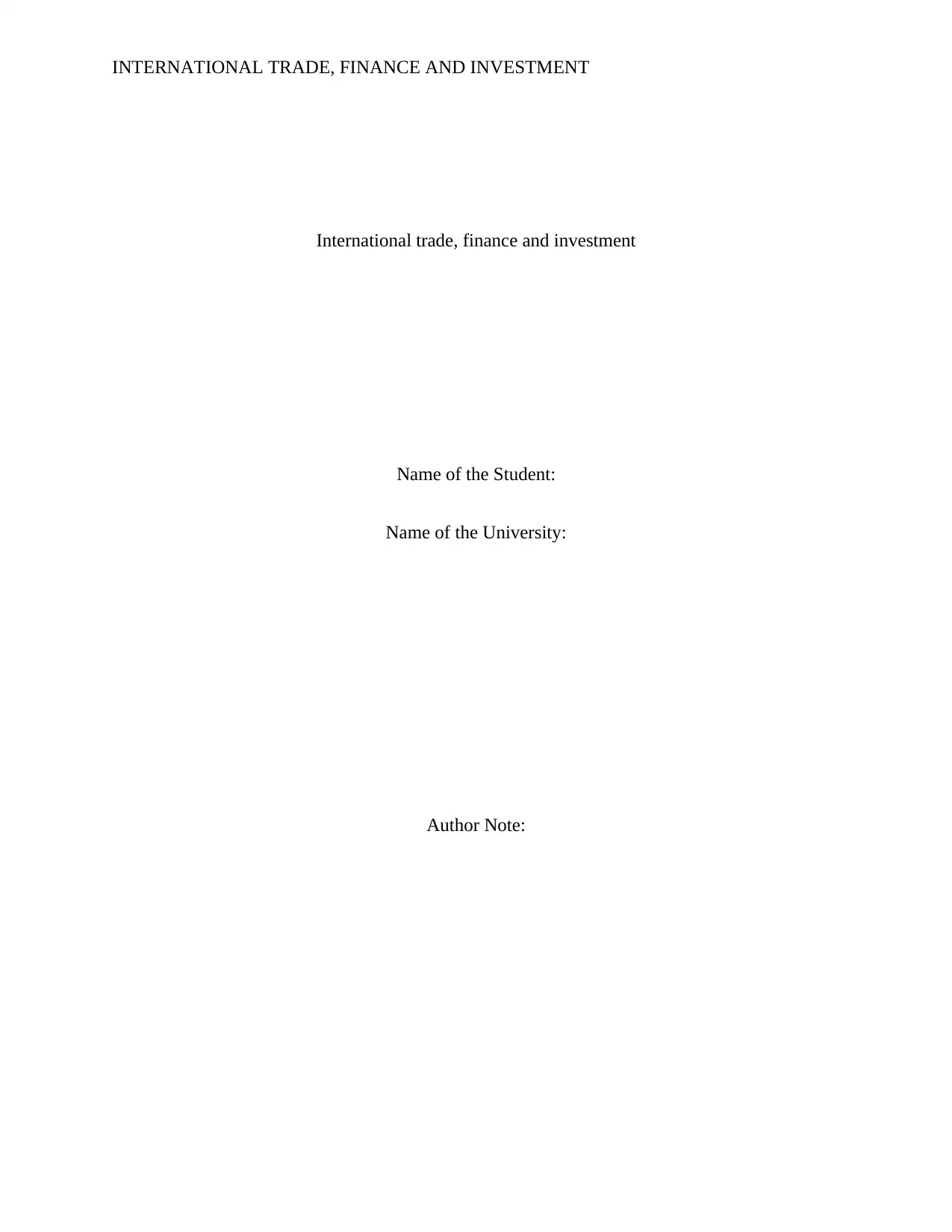
INTERNATIONAL TRADE, FINANCE AND INVESTMENT
International trade, finance and investment
Name of the Student:
Name of the University:
Author Note:
International trade, finance and investment
Name of the Student:
Name of the University:
Author Note:
Paraphrase This Document
Need a fresh take? Get an instant paraphrase of this document with our AI Paraphraser
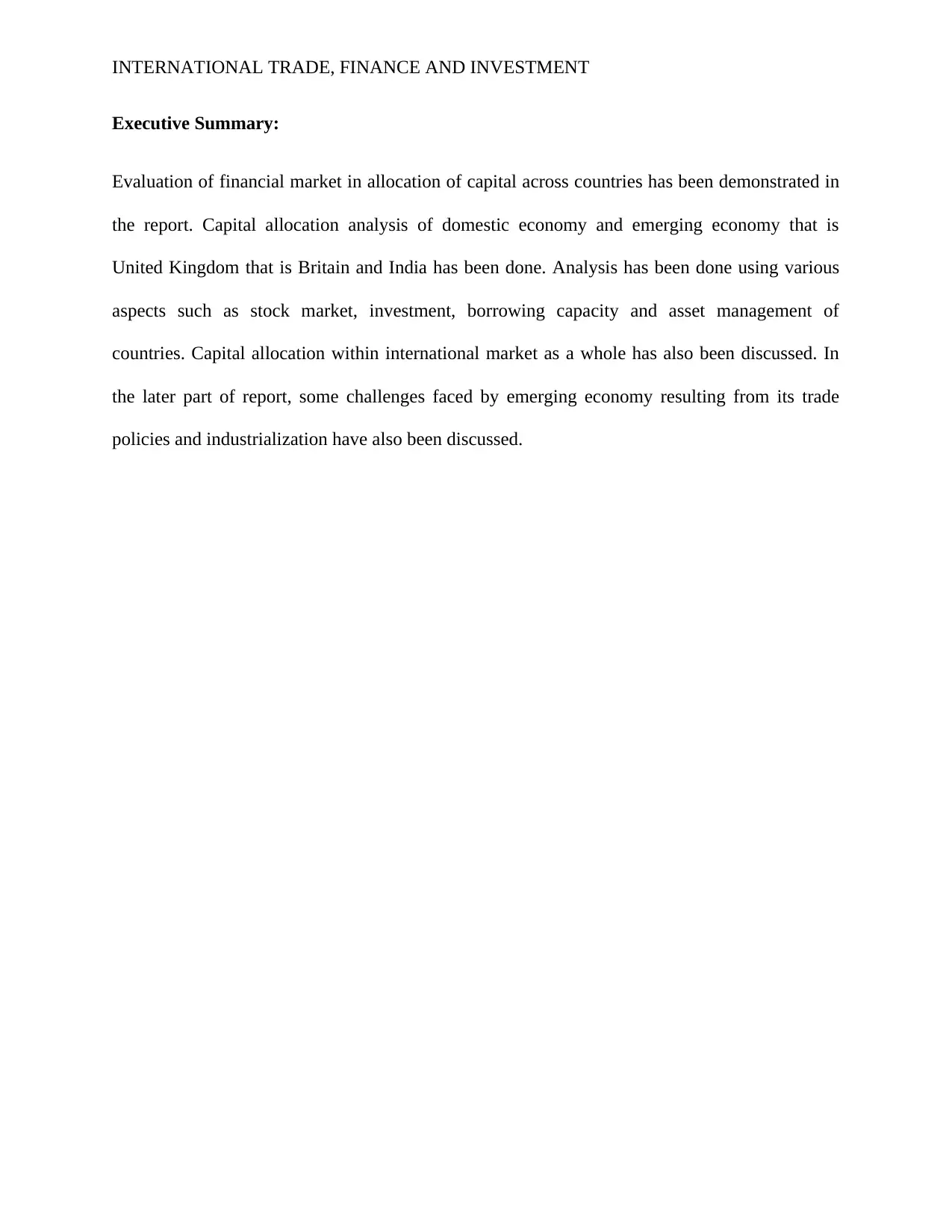
INTERNATIONAL TRADE, FINANCE AND INVESTMENT
Executive Summary:
Evaluation of financial market in allocation of capital across countries has been demonstrated in
the report. Capital allocation analysis of domestic economy and emerging economy that is
United Kingdom that is Britain and India has been done. Analysis has been done using various
aspects such as stock market, investment, borrowing capacity and asset management of
countries. Capital allocation within international market as a whole has also been discussed. In
the later part of report, some challenges faced by emerging economy resulting from its trade
policies and industrialization have also been discussed.
Executive Summary:
Evaluation of financial market in allocation of capital across countries has been demonstrated in
the report. Capital allocation analysis of domestic economy and emerging economy that is
United Kingdom that is Britain and India has been done. Analysis has been done using various
aspects such as stock market, investment, borrowing capacity and asset management of
countries. Capital allocation within international market as a whole has also been discussed. In
the later part of report, some challenges faced by emerging economy resulting from its trade
policies and industrialization have also been discussed.
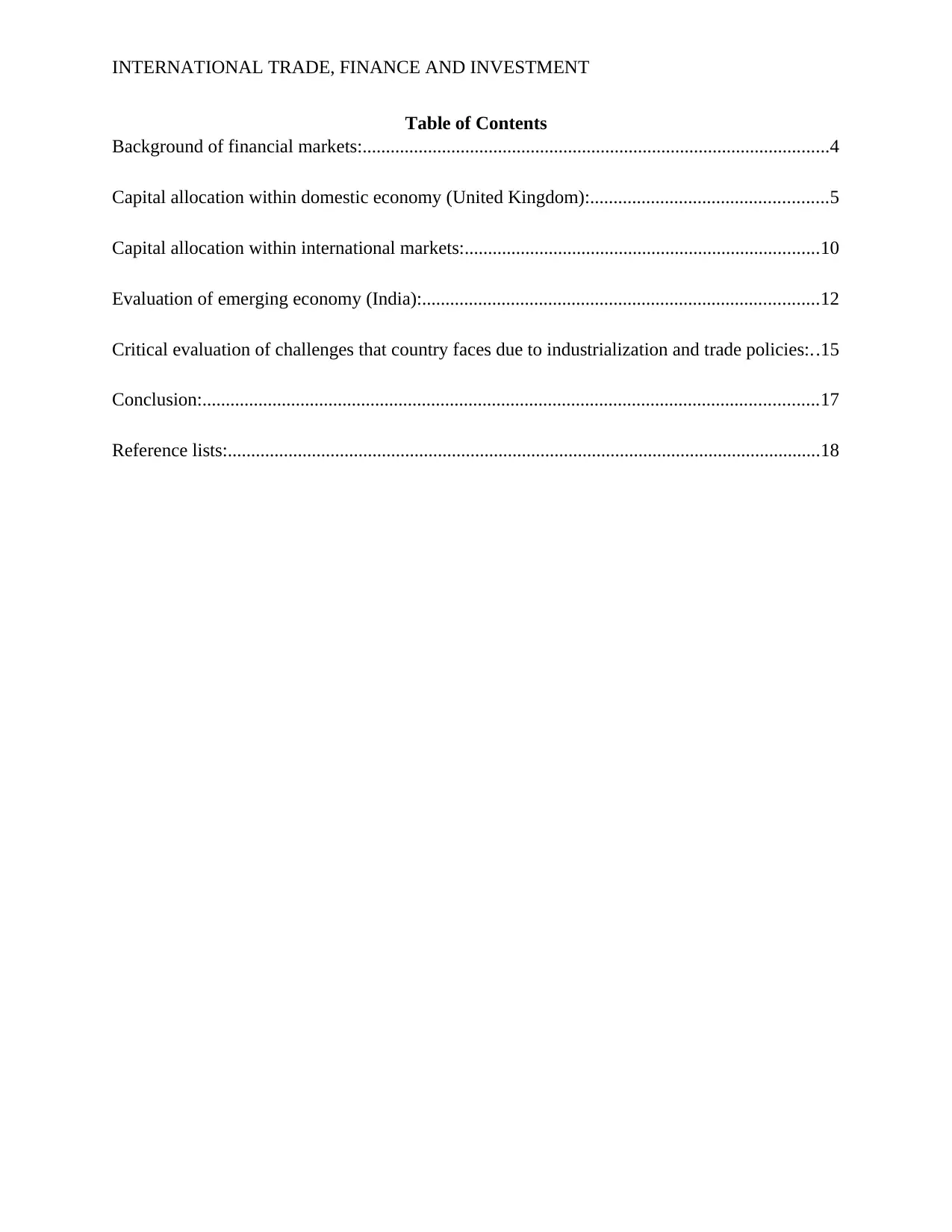
INTERNATIONAL TRADE, FINANCE AND INVESTMENT
Table of Contents
Background of financial markets:....................................................................................................4
Capital allocation within domestic economy (United Kingdom):...................................................5
Capital allocation within international markets:............................................................................10
Evaluation of emerging economy (India):.....................................................................................12
Critical evaluation of challenges that country faces due to industrialization and trade policies:..15
Conclusion:....................................................................................................................................17
Reference lists:...............................................................................................................................18
Table of Contents
Background of financial markets:....................................................................................................4
Capital allocation within domestic economy (United Kingdom):...................................................5
Capital allocation within international markets:............................................................................10
Evaluation of emerging economy (India):.....................................................................................12
Critical evaluation of challenges that country faces due to industrialization and trade policies:..15
Conclusion:....................................................................................................................................17
Reference lists:...............................................................................................................................18
⊘ This is a preview!⊘
Do you want full access?
Subscribe today to unlock all pages.

Trusted by 1+ million students worldwide
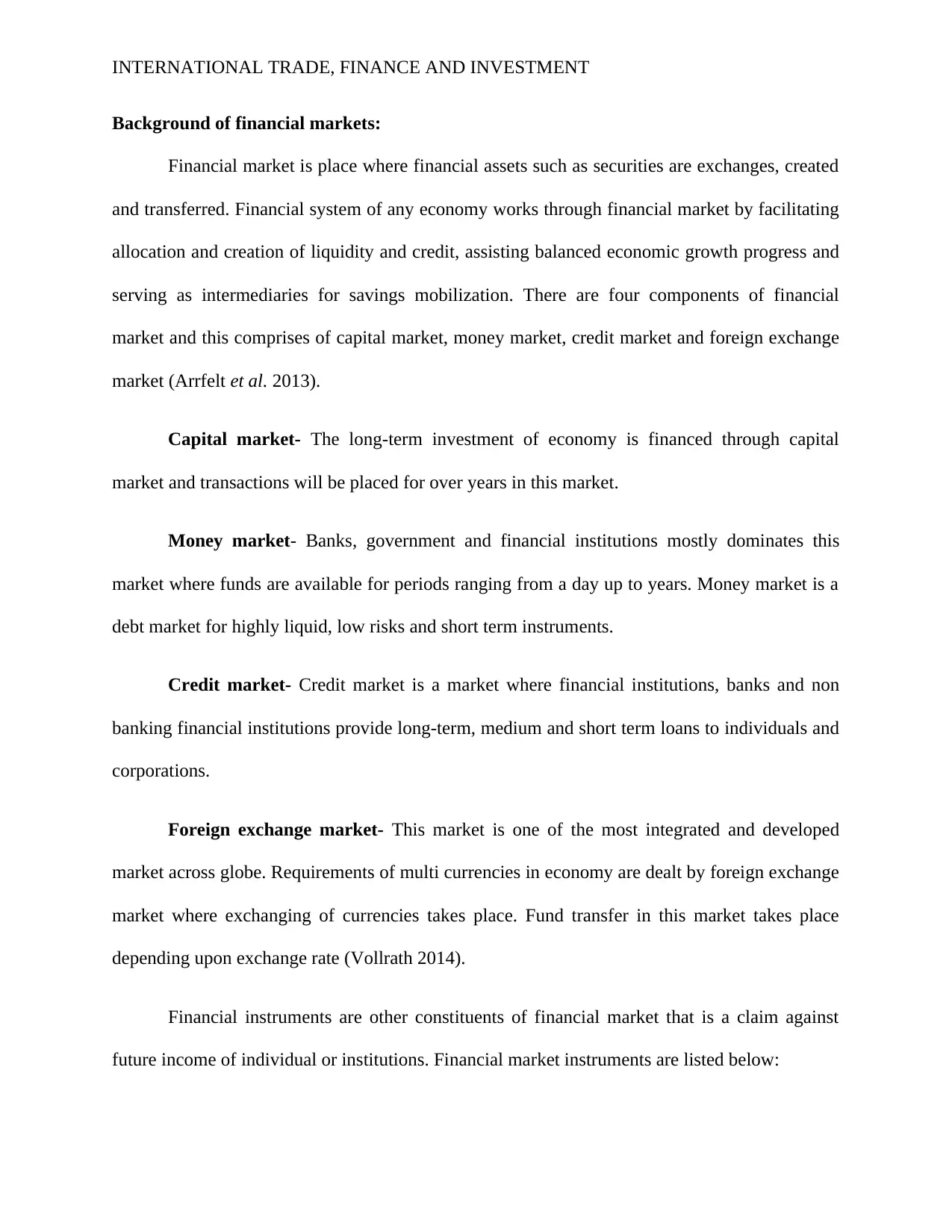
INTERNATIONAL TRADE, FINANCE AND INVESTMENT
Background of financial markets:
Financial market is place where financial assets such as securities are exchanges, created
and transferred. Financial system of any economy works through financial market by facilitating
allocation and creation of liquidity and credit, assisting balanced economic growth progress and
serving as intermediaries for savings mobilization. There are four components of financial
market and this comprises of capital market, money market, credit market and foreign exchange
market (Arrfelt et al. 2013).
Capital market- The long-term investment of economy is financed through capital
market and transactions will be placed for over years in this market.
Money market- Banks, government and financial institutions mostly dominates this
market where funds are available for periods ranging from a day up to years. Money market is a
debt market for highly liquid, low risks and short term instruments.
Credit market- Credit market is a market where financial institutions, banks and non
banking financial institutions provide long-term, medium and short term loans to individuals and
corporations.
Foreign exchange market- This market is one of the most integrated and developed
market across globe. Requirements of multi currencies in economy are dealt by foreign exchange
market where exchanging of currencies takes place. Fund transfer in this market takes place
depending upon exchange rate (Vollrath 2014).
Financial instruments are other constituents of financial market that is a claim against
future income of individual or institutions. Financial market instruments are listed below:
Background of financial markets:
Financial market is place where financial assets such as securities are exchanges, created
and transferred. Financial system of any economy works through financial market by facilitating
allocation and creation of liquidity and credit, assisting balanced economic growth progress and
serving as intermediaries for savings mobilization. There are four components of financial
market and this comprises of capital market, money market, credit market and foreign exchange
market (Arrfelt et al. 2013).
Capital market- The long-term investment of economy is financed through capital
market and transactions will be placed for over years in this market.
Money market- Banks, government and financial institutions mostly dominates this
market where funds are available for periods ranging from a day up to years. Money market is a
debt market for highly liquid, low risks and short term instruments.
Credit market- Credit market is a market where financial institutions, banks and non
banking financial institutions provide long-term, medium and short term loans to individuals and
corporations.
Foreign exchange market- This market is one of the most integrated and developed
market across globe. Requirements of multi currencies in economy are dealt by foreign exchange
market where exchanging of currencies takes place. Fund transfer in this market takes place
depending upon exchange rate (Vollrath 2014).
Financial instruments are other constituents of financial market that is a claim against
future income of individual or institutions. Financial market instruments are listed below:
Paraphrase This Document
Need a fresh take? Get an instant paraphrase of this document with our AI Paraphraser
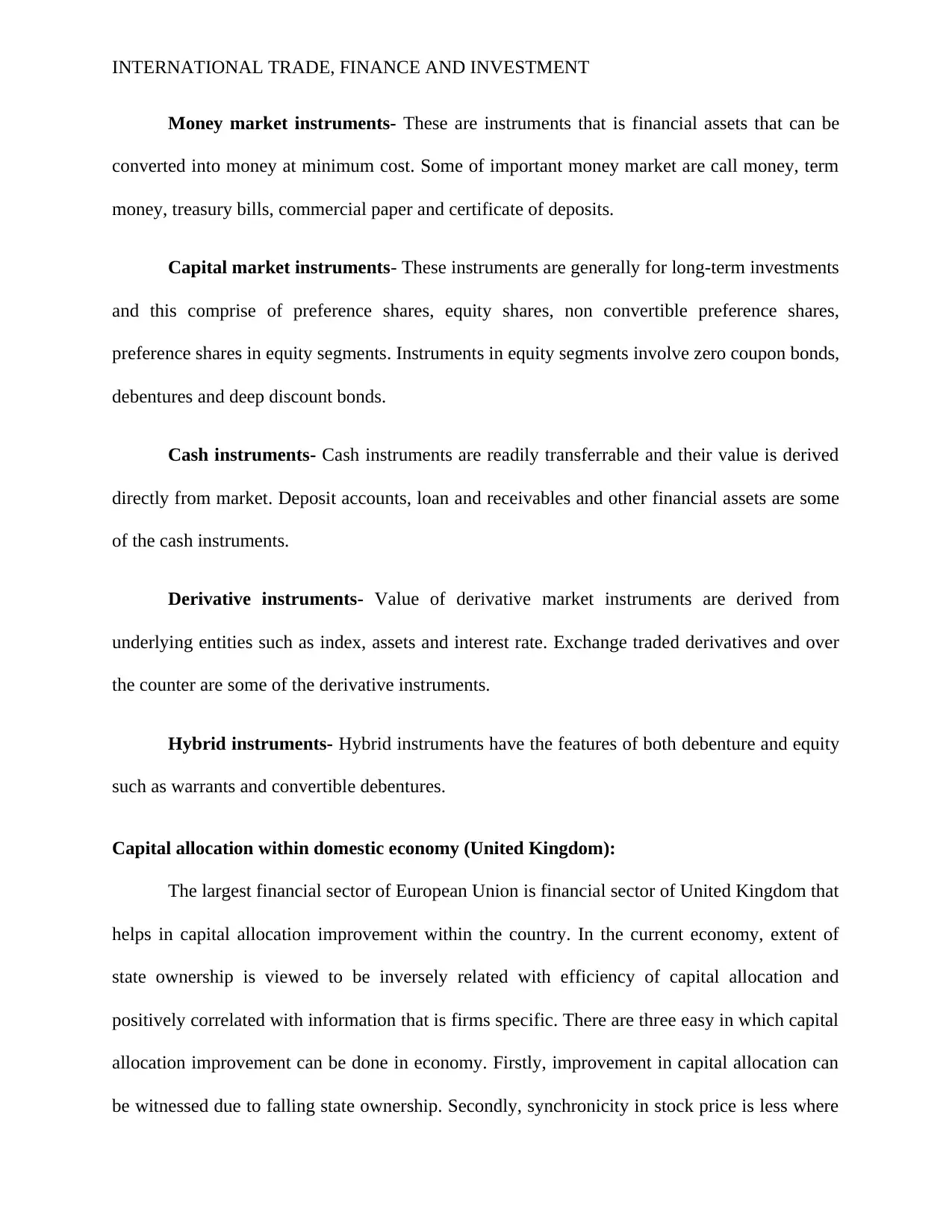
INTERNATIONAL TRADE, FINANCE AND INVESTMENT
Money market instruments- These are instruments that is financial assets that can be
converted into money at minimum cost. Some of important money market are call money, term
money, treasury bills, commercial paper and certificate of deposits.
Capital market instruments- These instruments are generally for long-term investments
and this comprise of preference shares, equity shares, non convertible preference shares,
preference shares in equity segments. Instruments in equity segments involve zero coupon bonds,
debentures and deep discount bonds.
Cash instruments- Cash instruments are readily transferrable and their value is derived
directly from market. Deposit accounts, loan and receivables and other financial assets are some
of the cash instruments.
Derivative instruments- Value of derivative market instruments are derived from
underlying entities such as index, assets and interest rate. Exchange traded derivatives and over
the counter are some of the derivative instruments.
Hybrid instruments- Hybrid instruments have the features of both debenture and equity
such as warrants and convertible debentures.
Capital allocation within domestic economy (United Kingdom):
The largest financial sector of European Union is financial sector of United Kingdom that
helps in capital allocation improvement within the country. In the current economy, extent of
state ownership is viewed to be inversely related with efficiency of capital allocation and
positively correlated with information that is firms specific. There are three easy in which capital
allocation improvement can be done in economy. Firstly, improvement in capital allocation can
be witnessed due to falling state ownership. Secondly, synchronicity in stock price is less where
Money market instruments- These are instruments that is financial assets that can be
converted into money at minimum cost. Some of important money market are call money, term
money, treasury bills, commercial paper and certificate of deposits.
Capital market instruments- These instruments are generally for long-term investments
and this comprise of preference shares, equity shares, non convertible preference shares,
preference shares in equity segments. Instruments in equity segments involve zero coupon bonds,
debentures and deep discount bonds.
Cash instruments- Cash instruments are readily transferrable and their value is derived
directly from market. Deposit accounts, loan and receivables and other financial assets are some
of the cash instruments.
Derivative instruments- Value of derivative market instruments are derived from
underlying entities such as index, assets and interest rate. Exchange traded derivatives and over
the counter are some of the derivative instruments.
Hybrid instruments- Hybrid instruments have the features of both debenture and equity
such as warrants and convertible debentures.
Capital allocation within domestic economy (United Kingdom):
The largest financial sector of European Union is financial sector of United Kingdom that
helps in capital allocation improvement within the country. In the current economy, extent of
state ownership is viewed to be inversely related with efficiency of capital allocation and
positively correlated with information that is firms specific. There are three easy in which capital
allocation improvement can be done in economy. Firstly, improvement in capital allocation can
be witnessed due to falling state ownership. Secondly, synchronicity in stock price is less where
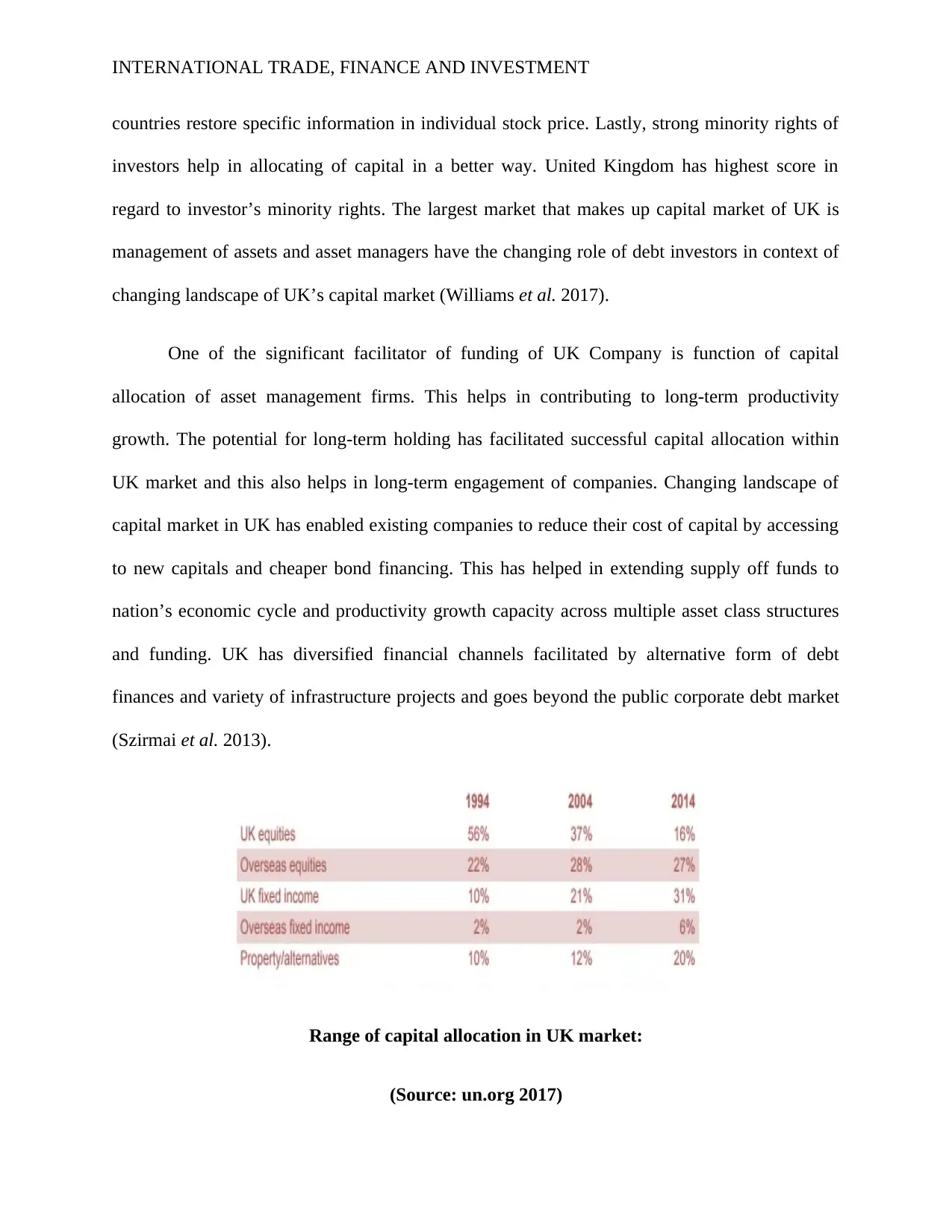
INTERNATIONAL TRADE, FINANCE AND INVESTMENT
countries restore specific information in individual stock price. Lastly, strong minority rights of
investors help in allocating of capital in a better way. United Kingdom has highest score in
regard to investor’s minority rights. The largest market that makes up capital market of UK is
management of assets and asset managers have the changing role of debt investors in context of
changing landscape of UK’s capital market (Williams et al. 2017).
One of the significant facilitator of funding of UK Company is function of capital
allocation of asset management firms. This helps in contributing to long-term productivity
growth. The potential for long-term holding has facilitated successful capital allocation within
UK market and this also helps in long-term engagement of companies. Changing landscape of
capital market in UK has enabled existing companies to reduce their cost of capital by accessing
to new capitals and cheaper bond financing. This has helped in extending supply off funds to
nation’s economic cycle and productivity growth capacity across multiple asset class structures
and funding. UK has diversified financial channels facilitated by alternative form of debt
finances and variety of infrastructure projects and goes beyond the public corporate debt market
(Szirmai et al. 2013).
Range of capital allocation in UK market:
(Source: un.org 2017)
countries restore specific information in individual stock price. Lastly, strong minority rights of
investors help in allocating of capital in a better way. United Kingdom has highest score in
regard to investor’s minority rights. The largest market that makes up capital market of UK is
management of assets and asset managers have the changing role of debt investors in context of
changing landscape of UK’s capital market (Williams et al. 2017).
One of the significant facilitator of funding of UK Company is function of capital
allocation of asset management firms. This helps in contributing to long-term productivity
growth. The potential for long-term holding has facilitated successful capital allocation within
UK market and this also helps in long-term engagement of companies. Changing landscape of
capital market in UK has enabled existing companies to reduce their cost of capital by accessing
to new capitals and cheaper bond financing. This has helped in extending supply off funds to
nation’s economic cycle and productivity growth capacity across multiple asset class structures
and funding. UK has diversified financial channels facilitated by alternative form of debt
finances and variety of infrastructure projects and goes beyond the public corporate debt market
(Szirmai et al. 2013).
Range of capital allocation in UK market:
(Source: un.org 2017)
⊘ This is a preview!⊘
Do you want full access?
Subscribe today to unlock all pages.

Trusted by 1+ million students worldwide
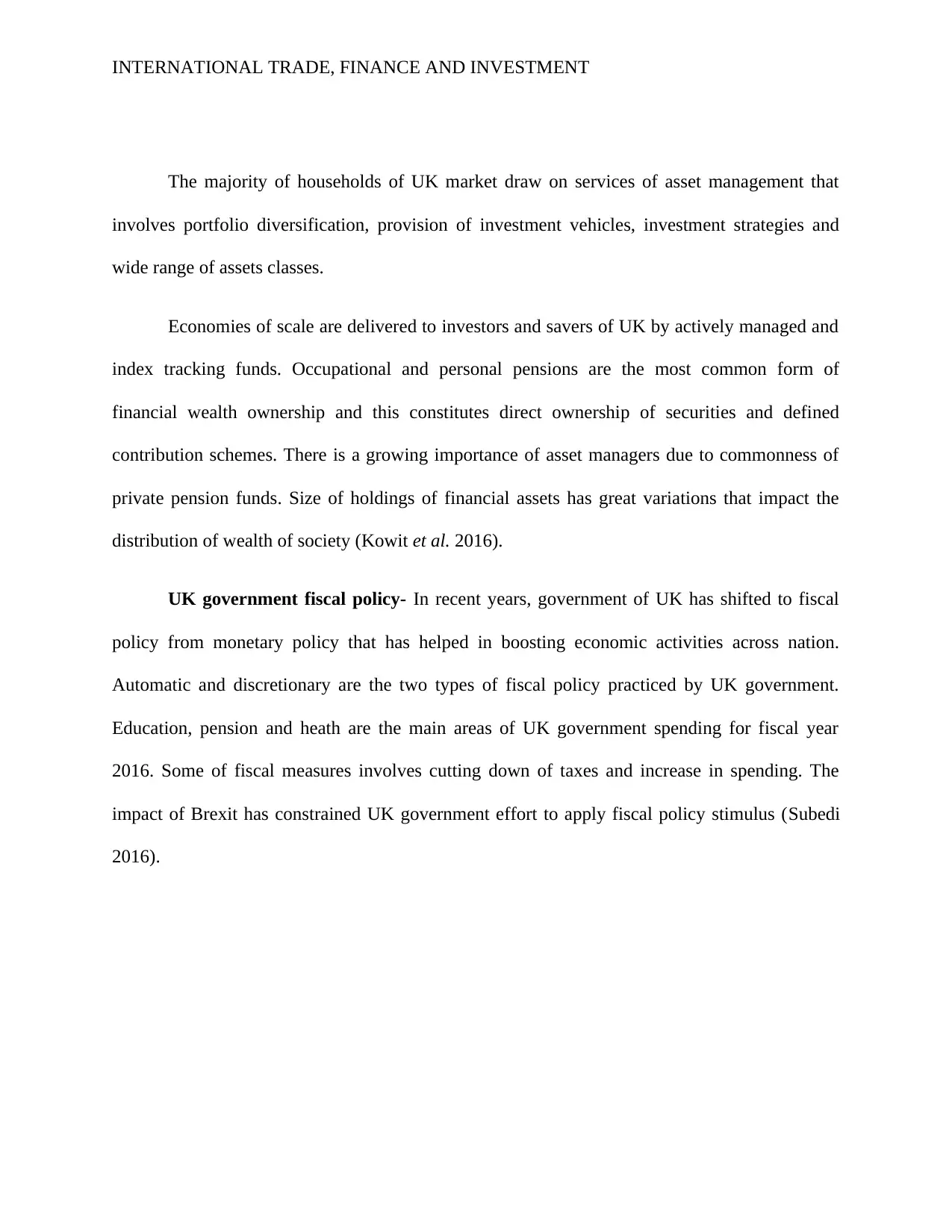
INTERNATIONAL TRADE, FINANCE AND INVESTMENT
The majority of households of UK market draw on services of asset management that
involves portfolio diversification, provision of investment vehicles, investment strategies and
wide range of assets classes.
Economies of scale are delivered to investors and savers of UK by actively managed and
index tracking funds. Occupational and personal pensions are the most common form of
financial wealth ownership and this constitutes direct ownership of securities and defined
contribution schemes. There is a growing importance of asset managers due to commonness of
private pension funds. Size of holdings of financial assets has great variations that impact the
distribution of wealth of society (Kowit et al. 2016).
UK government fiscal policy- In recent years, government of UK has shifted to fiscal
policy from monetary policy that has helped in boosting economic activities across nation.
Automatic and discretionary are the two types of fiscal policy practiced by UK government.
Education, pension and heath are the main areas of UK government spending for fiscal year
2016. Some of fiscal measures involves cutting down of taxes and increase in spending. The
impact of Brexit has constrained UK government effort to apply fiscal policy stimulus (Subedi
2016).
The majority of households of UK market draw on services of asset management that
involves portfolio diversification, provision of investment vehicles, investment strategies and
wide range of assets classes.
Economies of scale are delivered to investors and savers of UK by actively managed and
index tracking funds. Occupational and personal pensions are the most common form of
financial wealth ownership and this constitutes direct ownership of securities and defined
contribution schemes. There is a growing importance of asset managers due to commonness of
private pension funds. Size of holdings of financial assets has great variations that impact the
distribution of wealth of society (Kowit et al. 2016).
UK government fiscal policy- In recent years, government of UK has shifted to fiscal
policy from monetary policy that has helped in boosting economic activities across nation.
Automatic and discretionary are the two types of fiscal policy practiced by UK government.
Education, pension and heath are the main areas of UK government spending for fiscal year
2016. Some of fiscal measures involves cutting down of taxes and increase in spending. The
impact of Brexit has constrained UK government effort to apply fiscal policy stimulus (Subedi
2016).
Paraphrase This Document
Need a fresh take? Get an instant paraphrase of this document with our AI Paraphraser
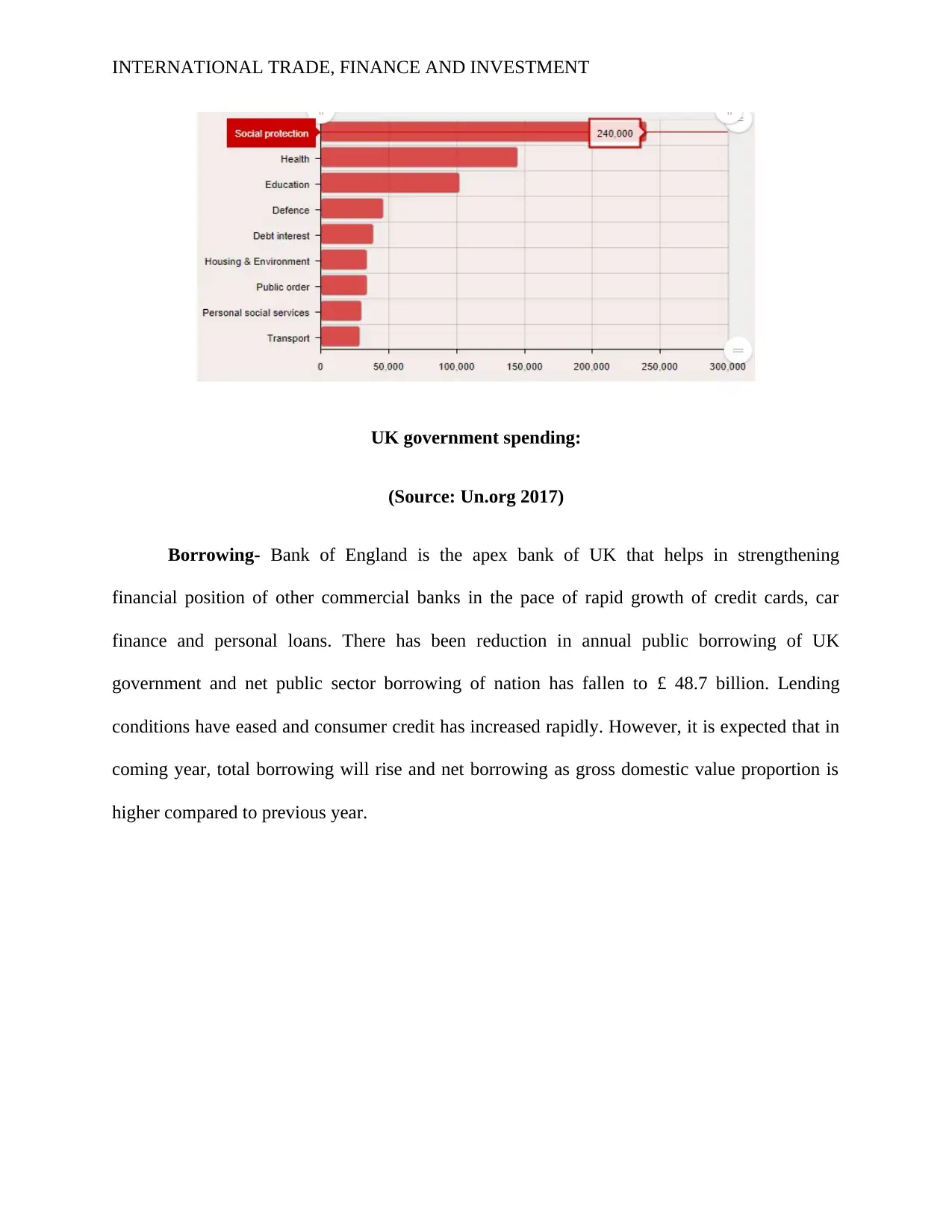
INTERNATIONAL TRADE, FINANCE AND INVESTMENT
UK government spending:
(Source: Un.org 2017)
Borrowing- Bank of England is the apex bank of UK that helps in strengthening
financial position of other commercial banks in the pace of rapid growth of credit cards, car
finance and personal loans. There has been reduction in annual public borrowing of UK
government and net public sector borrowing of nation has fallen to £ 48.7 billion. Lending
conditions have eased and consumer credit has increased rapidly. However, it is expected that in
coming year, total borrowing will rise and net borrowing as gross domestic value proportion is
higher compared to previous year.
UK government spending:
(Source: Un.org 2017)
Borrowing- Bank of England is the apex bank of UK that helps in strengthening
financial position of other commercial banks in the pace of rapid growth of credit cards, car
finance and personal loans. There has been reduction in annual public borrowing of UK
government and net public sector borrowing of nation has fallen to £ 48.7 billion. Lending
conditions have eased and consumer credit has increased rapidly. However, it is expected that in
coming year, total borrowing will rise and net borrowing as gross domestic value proportion is
higher compared to previous year.
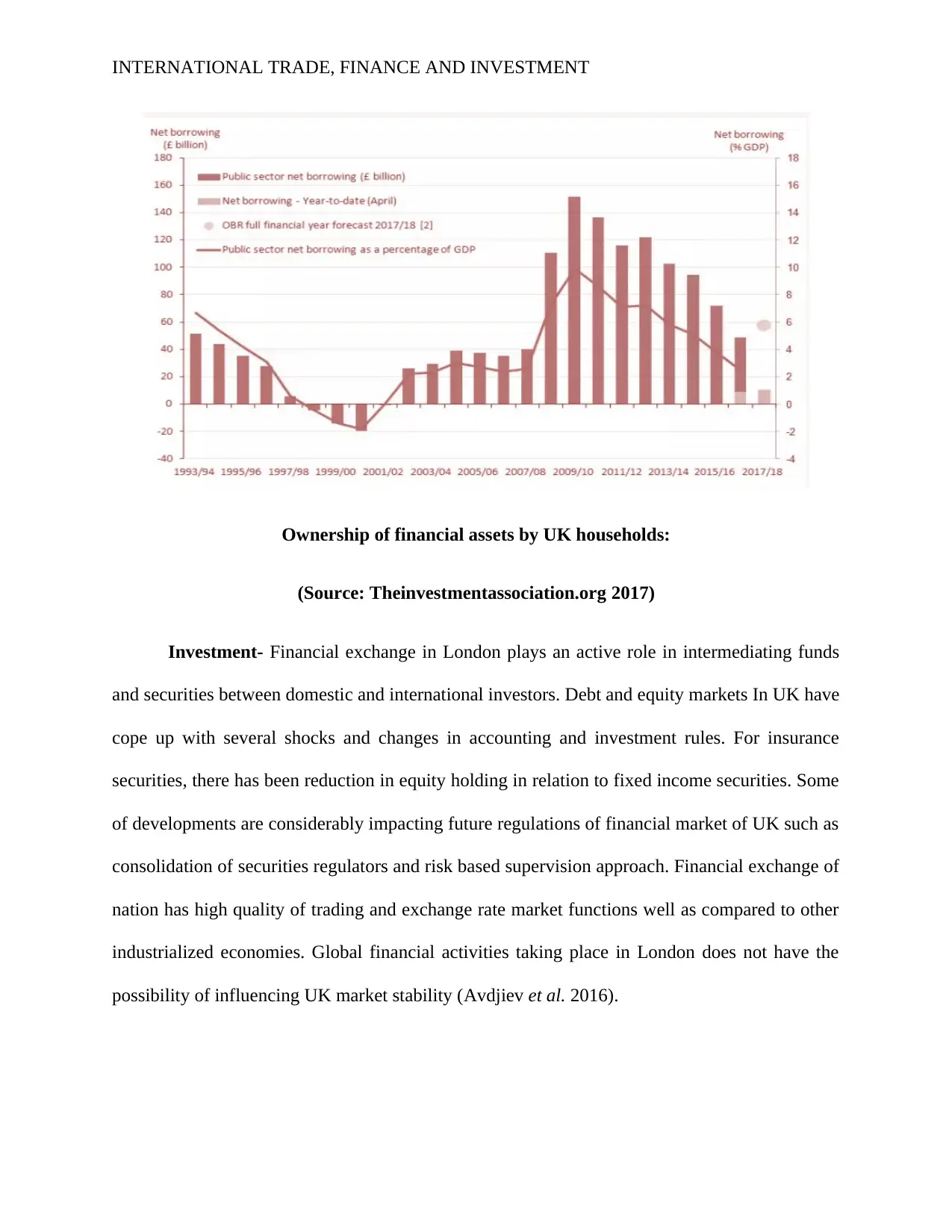
INTERNATIONAL TRADE, FINANCE AND INVESTMENT
Ownership of financial assets by UK households:
(Source: Theinvestmentassociation.org 2017)
Investment- Financial exchange in London plays an active role in intermediating funds
and securities between domestic and international investors. Debt and equity markets In UK have
cope up with several shocks and changes in accounting and investment rules. For insurance
securities, there has been reduction in equity holding in relation to fixed income securities. Some
of developments are considerably impacting future regulations of financial market of UK such as
consolidation of securities regulators and risk based supervision approach. Financial exchange of
nation has high quality of trading and exchange rate market functions well as compared to other
industrialized economies. Global financial activities taking place in London does not have the
possibility of influencing UK market stability (Avdjiev et al. 2016).
Ownership of financial assets by UK households:
(Source: Theinvestmentassociation.org 2017)
Investment- Financial exchange in London plays an active role in intermediating funds
and securities between domestic and international investors. Debt and equity markets In UK have
cope up with several shocks and changes in accounting and investment rules. For insurance
securities, there has been reduction in equity holding in relation to fixed income securities. Some
of developments are considerably impacting future regulations of financial market of UK such as
consolidation of securities regulators and risk based supervision approach. Financial exchange of
nation has high quality of trading and exchange rate market functions well as compared to other
industrialized economies. Global financial activities taking place in London does not have the
possibility of influencing UK market stability (Avdjiev et al. 2016).
⊘ This is a preview!⊘
Do you want full access?
Subscribe today to unlock all pages.

Trusted by 1+ million students worldwide
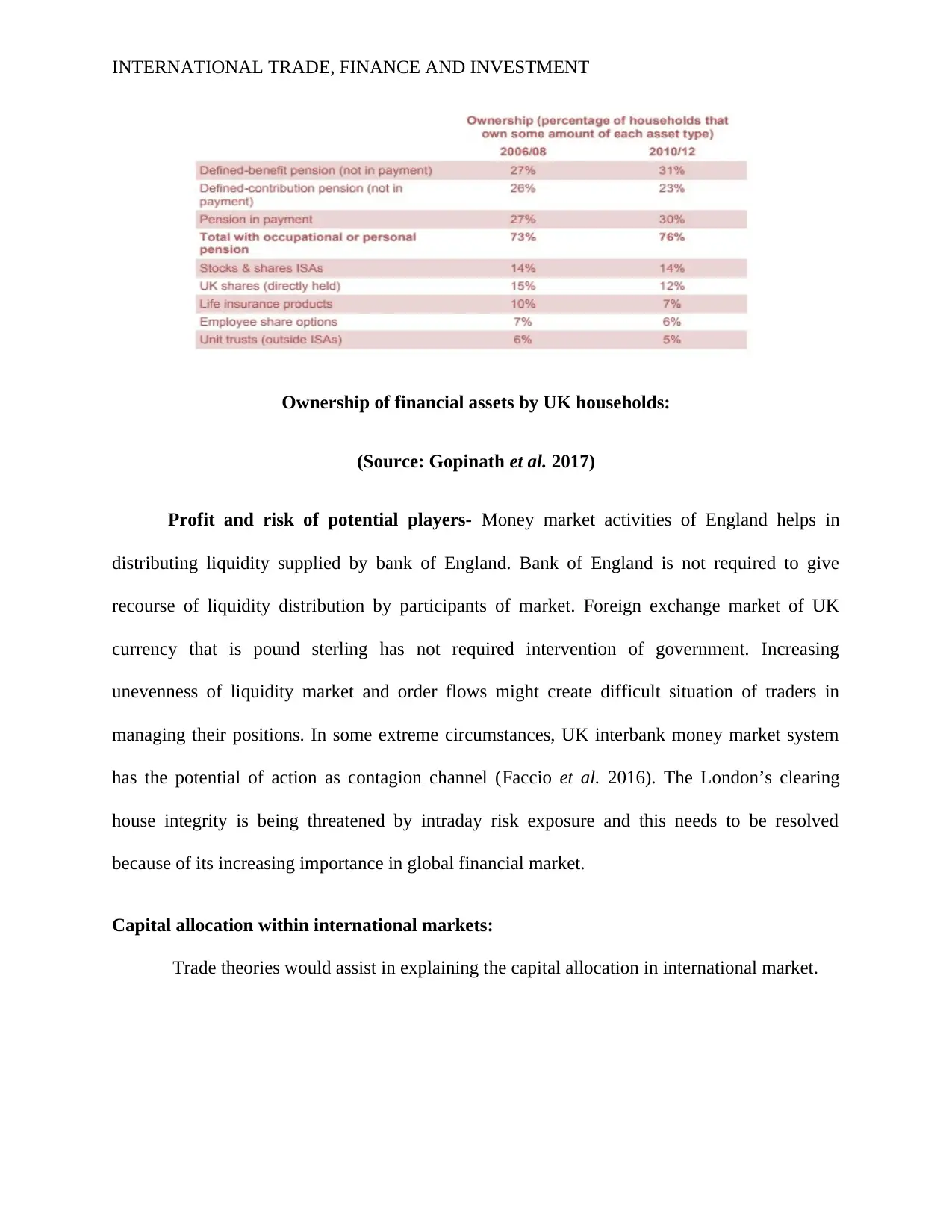
INTERNATIONAL TRADE, FINANCE AND INVESTMENT
Ownership of financial assets by UK households:
(Source: Gopinath et al. 2017)
Profit and risk of potential players- Money market activities of England helps in
distributing liquidity supplied by bank of England. Bank of England is not required to give
recourse of liquidity distribution by participants of market. Foreign exchange market of UK
currency that is pound sterling has not required intervention of government. Increasing
unevenness of liquidity market and order flows might create difficult situation of traders in
managing their positions. In some extreme circumstances, UK interbank money market system
has the potential of action as contagion channel (Faccio et al. 2016). The London’s clearing
house integrity is being threatened by intraday risk exposure and this needs to be resolved
because of its increasing importance in global financial market.
Capital allocation within international markets:
Trade theories would assist in explaining the capital allocation in international market.
Ownership of financial assets by UK households:
(Source: Gopinath et al. 2017)
Profit and risk of potential players- Money market activities of England helps in
distributing liquidity supplied by bank of England. Bank of England is not required to give
recourse of liquidity distribution by participants of market. Foreign exchange market of UK
currency that is pound sterling has not required intervention of government. Increasing
unevenness of liquidity market and order flows might create difficult situation of traders in
managing their positions. In some extreme circumstances, UK interbank money market system
has the potential of action as contagion channel (Faccio et al. 2016). The London’s clearing
house integrity is being threatened by intraday risk exposure and this needs to be resolved
because of its increasing importance in global financial market.
Capital allocation within international markets:
Trade theories would assist in explaining the capital allocation in international market.
Paraphrase This Document
Need a fresh take? Get an instant paraphrase of this document with our AI Paraphraser
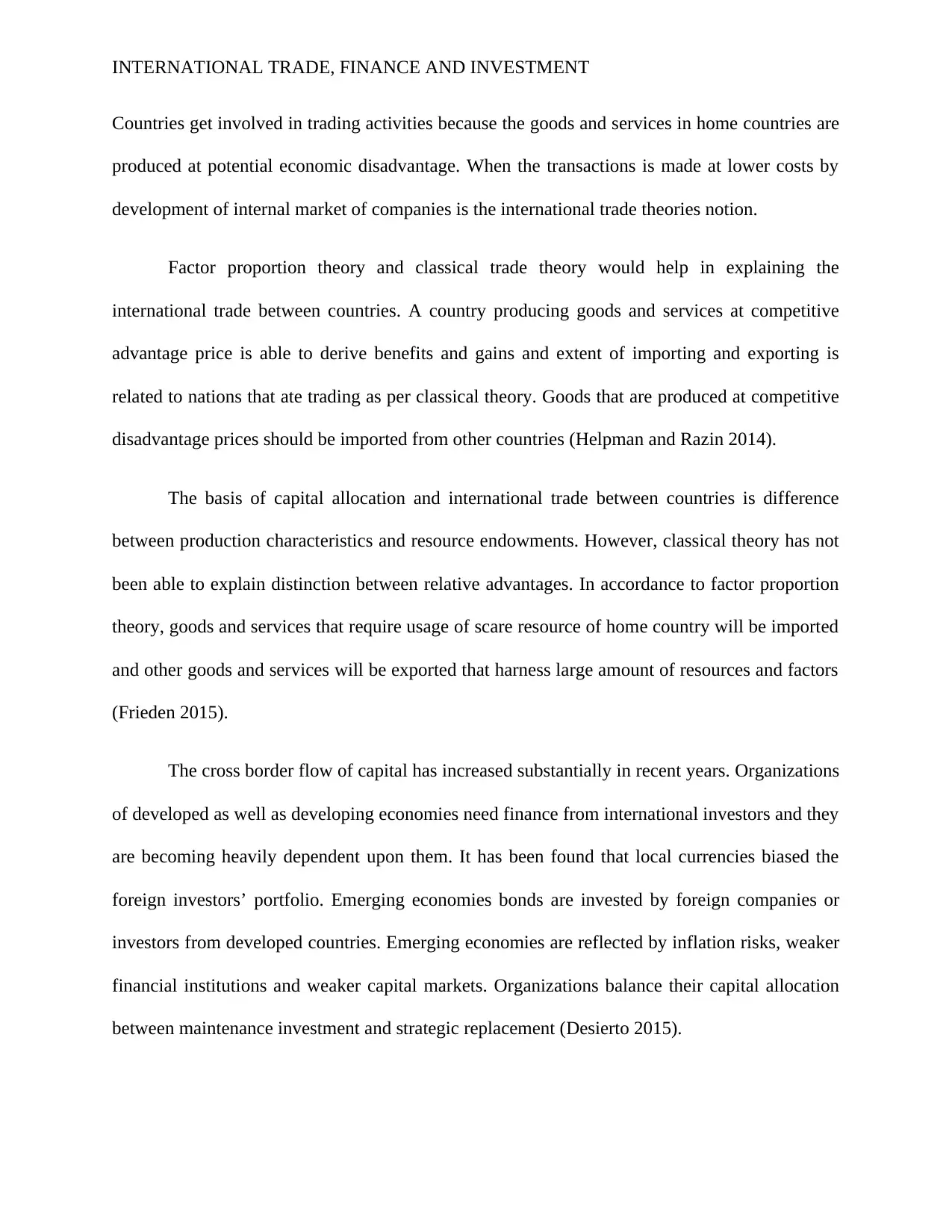
INTERNATIONAL TRADE, FINANCE AND INVESTMENT
Countries get involved in trading activities because the goods and services in home countries are
produced at potential economic disadvantage. When the transactions is made at lower costs by
development of internal market of companies is the international trade theories notion.
Factor proportion theory and classical trade theory would help in explaining the
international trade between countries. A country producing goods and services at competitive
advantage price is able to derive benefits and gains and extent of importing and exporting is
related to nations that ate trading as per classical theory. Goods that are produced at competitive
disadvantage prices should be imported from other countries (Helpman and Razin 2014).
The basis of capital allocation and international trade between countries is difference
between production characteristics and resource endowments. However, classical theory has not
been able to explain distinction between relative advantages. In accordance to factor proportion
theory, goods and services that require usage of scare resource of home country will be imported
and other goods and services will be exported that harness large amount of resources and factors
(Frieden 2015).
The cross border flow of capital has increased substantially in recent years. Organizations
of developed as well as developing economies need finance from international investors and they
are becoming heavily dependent upon them. It has been found that local currencies biased the
foreign investors’ portfolio. Emerging economies bonds are invested by foreign companies or
investors from developed countries. Emerging economies are reflected by inflation risks, weaker
financial institutions and weaker capital markets. Organizations balance their capital allocation
between maintenance investment and strategic replacement (Desierto 2015).
Countries get involved in trading activities because the goods and services in home countries are
produced at potential economic disadvantage. When the transactions is made at lower costs by
development of internal market of companies is the international trade theories notion.
Factor proportion theory and classical trade theory would help in explaining the
international trade between countries. A country producing goods and services at competitive
advantage price is able to derive benefits and gains and extent of importing and exporting is
related to nations that ate trading as per classical theory. Goods that are produced at competitive
disadvantage prices should be imported from other countries (Helpman and Razin 2014).
The basis of capital allocation and international trade between countries is difference
between production characteristics and resource endowments. However, classical theory has not
been able to explain distinction between relative advantages. In accordance to factor proportion
theory, goods and services that require usage of scare resource of home country will be imported
and other goods and services will be exported that harness large amount of resources and factors
(Frieden 2015).
The cross border flow of capital has increased substantially in recent years. Organizations
of developed as well as developing economies need finance from international investors and they
are becoming heavily dependent upon them. It has been found that local currencies biased the
foreign investors’ portfolio. Emerging economies bonds are invested by foreign companies or
investors from developed countries. Emerging economies are reflected by inflation risks, weaker
financial institutions and weaker capital markets. Organizations balance their capital allocation
between maintenance investment and strategic replacement (Desierto 2015).
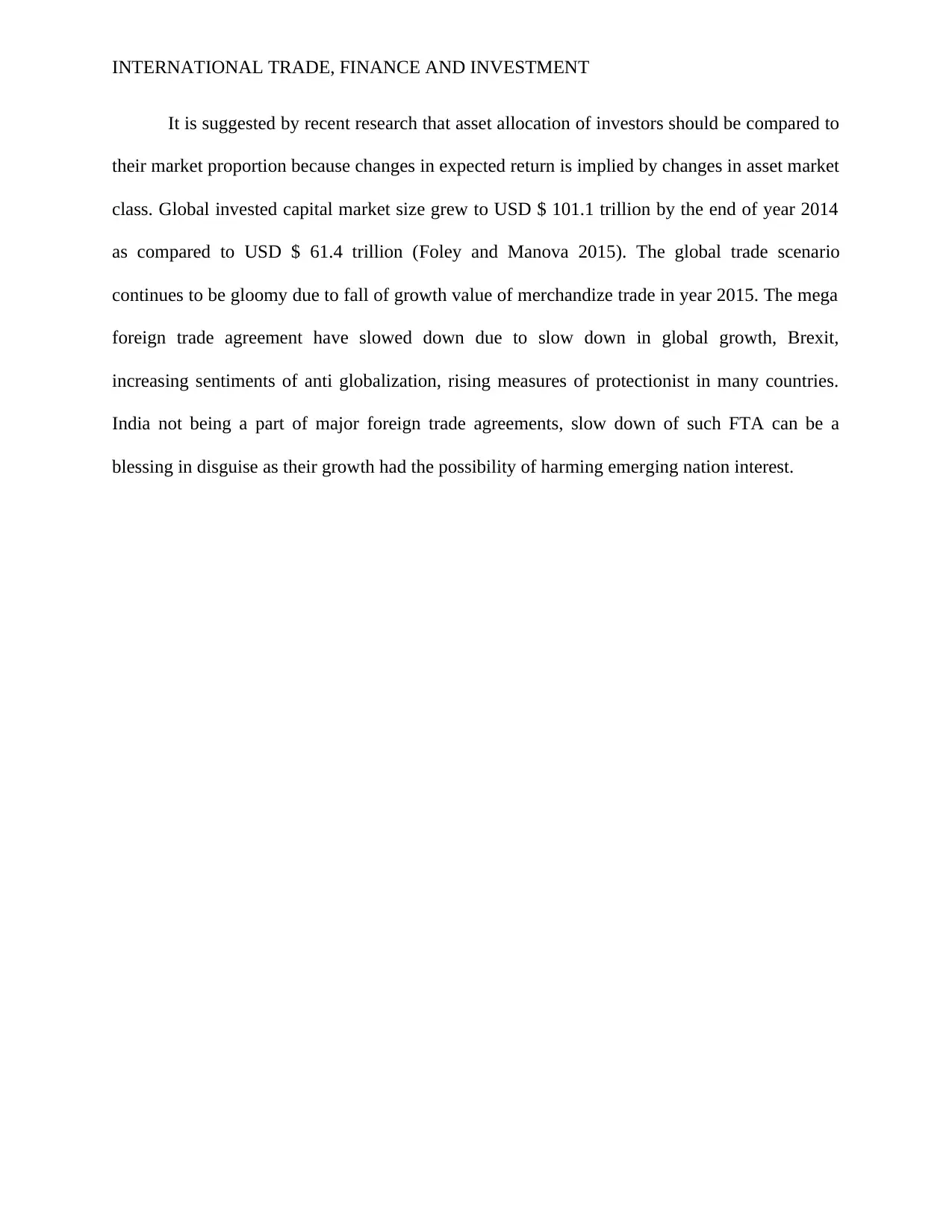
INTERNATIONAL TRADE, FINANCE AND INVESTMENT
It is suggested by recent research that asset allocation of investors should be compared to
their market proportion because changes in expected return is implied by changes in asset market
class. Global invested capital market size grew to USD $ 101.1 trillion by the end of year 2014
as compared to USD $ 61.4 trillion (Foley and Manova 2015). The global trade scenario
continues to be gloomy due to fall of growth value of merchandize trade in year 2015. The mega
foreign trade agreement have slowed down due to slow down in global growth, Brexit,
increasing sentiments of anti globalization, rising measures of protectionist in many countries.
India not being a part of major foreign trade agreements, slow down of such FTA can be a
blessing in disguise as their growth had the possibility of harming emerging nation interest.
It is suggested by recent research that asset allocation of investors should be compared to
their market proportion because changes in expected return is implied by changes in asset market
class. Global invested capital market size grew to USD $ 101.1 trillion by the end of year 2014
as compared to USD $ 61.4 trillion (Foley and Manova 2015). The global trade scenario
continues to be gloomy due to fall of growth value of merchandize trade in year 2015. The mega
foreign trade agreement have slowed down due to slow down in global growth, Brexit,
increasing sentiments of anti globalization, rising measures of protectionist in many countries.
India not being a part of major foreign trade agreements, slow down of such FTA can be a
blessing in disguise as their growth had the possibility of harming emerging nation interest.
⊘ This is a preview!⊘
Do you want full access?
Subscribe today to unlock all pages.

Trusted by 1+ million students worldwide
1 out of 22
Related Documents
Your All-in-One AI-Powered Toolkit for Academic Success.
+13062052269
info@desklib.com
Available 24*7 on WhatsApp / Email
![[object Object]](/_next/static/media/star-bottom.7253800d.svg)
Unlock your academic potential
Copyright © 2020–2026 A2Z Services. All Rights Reserved. Developed and managed by ZUCOL.




